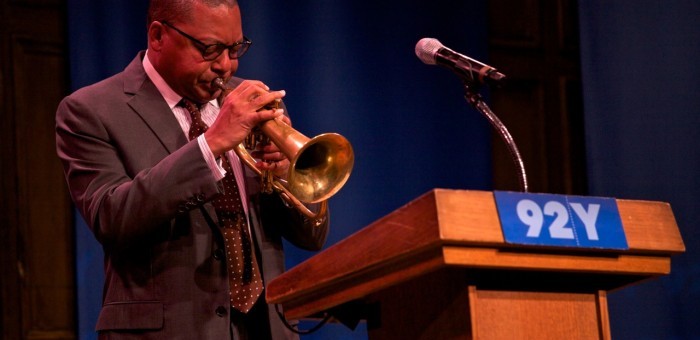Jan 13, 2026 2:09 PM
More Trump-Kennedy Center Cancellations
The fallout from the renaming of the John F. Kennedy Center for the Performing Arts to include President Donald…

Wynton Marsalis performs during a tribute to author and theoretician Albert Murray on Nov. 28 at the 92nd Street Y in New York.
(Photo: © 2016 Nancy Crampton)Novelist Ayana Mathis was shocked when she first discovered the writing of critic, essayist and fellow fiction writer Albert Murray—shocked that she’d never heard of him before, and shocked all the more when she started talking to friends, all black authors around 40 years of age like herself, and found they’d never heard of him either.
Mathis—whose first novel, The Twelve Tribes of Hattie, rocketed up the New York Times best-seller list after being picked for Oprah’s Book Club in 2012—was one of five readers at the launch of a new collection of Murray’s work and the only one who didn’t know him personally.
While Henry Louis Gates Jr. and Wynton Marsalis were able to reminisce about learning at the feet of the African American scholar and thinker (who died in 2013 at the age of 97), Mathis could only lament the missed opportunity and be grateful for the hopeful restitution of his reputation.
“I think that it is astounding and a travesty,” she said of Murray’s work not being better known. “That is why it is so important that his work is being anthologized.”
The Nov. 28 reading marked Murray’s entry into the Library of America, which since 1979 has worked to keep available the writings of such writers as James Baldwin, Jack Kerouac, Gertrude Stein, Mark Twain and Richard Wright.
Gates, a Library of America board member, recalled meeting Murray when he was 28 and working as an associate professor at Yale. He already knew Murray’s writings, he said, and got to know him over long lunches with Murray and the painter Romare Bearden.
“His contrariness, his willingness to stand up to intellectual bullies from the right or the left, influenced me,” he said.
Gates read Murray’s “Soul: 32 Meanings Not in Your Dictionary” (written in 1968 and included Albert Murray: Collected Essays & Memoirs, the new Library of America edition) to the audience at the 92nd Street Y on Manhattan’s Upper East Side, giving melodic inflection and a lilting humor to such observations as “African robes do not become soul until worn by U.S. Negro dandies.”
But it was Marsalis, ever the showman, who owned the night. He recalled listening to Murray’s monologues and being left in a daze. “I understood words like ‘a’ and ‘the,’ but nothing in between,” he said. “He would assume you’ve read all of Thomas Mann.”
With horn in hand, he read from Murray’s “The Hero and the Blues” before laying down some solo swing.
“I learned so much from him over the 30 years I knew him,” Marsalis said. “Above all, he was about excellence.”
Author Renata Adler, a longtime staffer at The New Yorker, recalled Murray as a man who would oppose anyone too far to the right or too far to the left or who conformed to any group. Before reading from his “The Blues Face to Face,” she noted that he wrote nonfiction with the cadences of a novelist and theory with an unusual passion. And, she said, he brought all of that talent to his writings about music.
“Too much contemporary writing, in my view, is the critic being the judge,” she opined, “and that’s not the job.” DB

Belá Fleck during an interview with Fredrika Whitfield on CNN.
Jan 13, 2026 2:09 PM
The fallout from the renaming of the John F. Kennedy Center for the Performing Arts to include President Donald…

Peplowski first came to prominence in legacy swing bands, including the final iteration of the Benny Goodman Orchestra, before beginning a solo career in the late 1980s.
Feb 3, 2026 12:10 AM
Ken Peplowski, a clarinetist and tenor saxophonist who straddled the worlds of traditional and modern jazz, died Feb. 2…

The success of Oregon’s first album, 1971’s Music Of Another Present Era, allowed Towner to establish a solo career.
Jan 19, 2026 5:02 PM
Ralph Towner, a guitarist and composer who blended multiple genres, including jazz — and throughout them all remained…

Rico’s Anti-Microbial Instrument Swab
Jan 19, 2026 2:48 PM
With this year’s NAMM Show right around the corner, we can look forward to plenty of new and innovative instruments…

Richie Beirach was particularly renowned for his approach to chromatic harmony, which he used to improvise reharmonizations of originals and standards.
Jan 27, 2026 11:19 AM
Richie Beirach, a pianist and composer who channeled a knowledge of modern classical music into his jazz practice,…